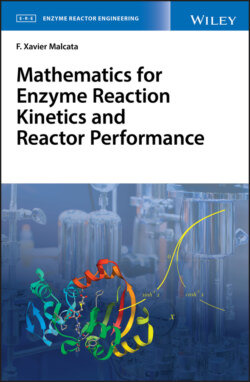Читать книгу Mathematics for Enzyme Reaction Kinetics and Reactor Performance - F. Xavier Malcata - Страница 11
Оглавление
About the Author
Par est scientia laboris.
(Work is ever the mate of science.)
Prof. F. Xavier Malcata was born in Malange (Angola) in 1963, and earned: a B.Sc. degree in Chemical Engineering (5‐year program), from the University of Porto (UP, Portugal) in 1986 (with first class honors); a Ph.D. degree in Chemical Engineering (with a distributed minor in Food Science, Statistics and Biochemistry), from the University of Wisconsin (UW, USA) in 1991; an equivalent Doctoral degree in Biotechnology – food science and technology, from the Portuguese Catholic University (UCP, Portugal) in 1998; and a Habilitation degree in Food Science and Engineering, also from UCP, in 2004.
Prof. Malcata has held academic appointments as: Teaching Assistant at UCP in 1985–1987 and at UW in 1988; Lecturer at UW in 1989; Assistant Professor at UCP in 1991–1998; Associate Professor at UCP in 1998–2004; and Full Professor at UCP in 2004–2010, Superior Institute of Maia (ISMAI, Portugal) in 2010–2012, and UP since 2012. He also held professional appointments as: Dean of the College of Biotechnology of UCP in 1998–2008; President of the Portuguese Society of Biotechnology in 2003–2008; Coordinator of the Northern Chapter of Chemical Engineering of the Portuguese Engineering Accreditation Board in 2004–2009; Official Delegate, in 2002–2013, of the Portuguese Government to the VI and VII Framework Programs of R&D held by the European Union – in such key areas as food quality and safety, and food, agriculture (including fisheries), and biotechnology, respectively; Chief Executive Officer of the University/Industry Extension (nonprofit) Associations AESBUC in 1998–2008 and INTERVIR+ in 2006–2008; and Chief Executive Officer of the Entrepreneurial Biotechnological Support Associations CiDEB in 2005–2008 and INOVAR&CRESCER in 2006–2008.
Over the years, the author has received several national and international public recognitions and awards, including: Cristiano P. Spratley Award by UP, in 1985; Centennial Award by UP, in 1986; election for membership in Phi Tau Sigma – honor society of food science (USA), in 1990; election for Sigma Xi – honor society of scientific and engineering research (USA), in 1990; election for Tau Beta Pi – honor society of engineering (USA), in 1991; Ralph H. Potts Memorial Award by American Oil Chemists’ Society (AOCS, USA), in 1991; election for New York Academy of Sciences (USA), in 1992; Foundation Scholar Award – dairy foods division by American Dairy Science Associaton (ADSA, USA), in 1998; decoration as Chevalier dans l’Ordre des Palmes Académiques by French Government, in 1999; Young Scientist Research Award by AOCS, in 2001; Canadian/International Constituency Investigator Award in Physical Sciences and Engineering by Sigma Xi, in 2002 and 2004; Excellence Promotion Award by Portuguese Foundation for Science and Technology (Portugal), in 2005; Danisco International Dairy Science Award by ADSA, in 2007; Edgar Cardoso Innovation Award by the Mayor of Gaia, in 2007; Scientist of the Year Award by European Federation of Food Science and Technology (Netherlands), in 2007; Samuel C. Prescott Award by Institute of Food Technologists (IFT, USA), in 2008; International Leadership Award by International Association of Food Protection (IAFP, USA), in 2008; election for Fellow by IFT, in 2011; Elmer Marth Educator Award by IAFP, in 2011; election for Fellow by International Academy of Food Science and Technology (IAFoST), in 2012; Distinguished Service Award by ADSA, in 2012; election for Fellow by ADSA, in 2013; J. Dairy Sci. Most Cited Paper Award by ADSA, in 2012; William V. Cruess Award for excellence in teaching by IFT, in 2014; and election for Fellow by AOCS, in 2014.
Among his many scientific interests, Prof. Malcata has focused his research chiefly on four major areas: theoretical simulation and optimization of enzyme reactors, theoretical optimization of thermodynamically and kinetically controlled processes, production and immobilization of oxidoreductases and hydrolases for industrial applications, and design and optimization of bioreactors to produce and process edible oils. In addition, he has developed work on: microbiological and biochemical characterization and technological improvement of traditional foods, development of nutraceutical ingredients and functional foods, rational application of unit operations to specific agri‐food processing, and design and development of novel photobioreactors for cultivation of microalgae, aimed at biofuel or high added‐value compound production. To date, he has published more than 400 papers in peer‐reviewed international journals that received more than 12000 official citations in all (without self-citations), corresponding to an h‐index of 54; he has supervised 30 Ph.D. dissertations successfully concluded; he has written 14 monographs and edited 5 multiauthored books; he has authored more than 50 chapters in edited books and 35 papers in trade journals, besides more than 50 technical publications. He was also a member of about 60 peer‐reviewing committees of research projects and fellowships; he has acted as supervisor of 90 individual fellowships, most at Ph.D. and postdoctoral levels, and collaborated in 60 research and development projects – of which he has served as principal investigator in 36; he has participated in 50 organizing/scientific committees of professional meetings; he has delivered 150+ invited lectures worldwide, besides almost 600 volunteer presentations in congresses and workshops; he has served in the editorial board of 5 major journals in the applied biotechnology, and food science and engineering areas; and he has reviewed several hundred manuscripts for journals and encyclopedia. He has been a longstanding member of American Institute of Chemical Engineers, American Chemical Society, IFT, American Association for the Advancement of Science, AOCS, IAFP, and ADSA.
